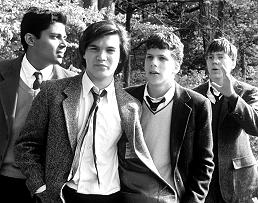| Character vs. Achievement | ||
| Emperor's Club | ||
 |
||
| Review by Ross Anthony | ||
|
An unusual mixture of innocence and pomposity. Kevin Kline tries his hand at a proper/snootier "Dead Poet's Society." Though not quite the classic, "Emperor's Club" still has its moments. An interesting story with a pertinent (cinematically unique) message, told fairly well and scored to perfection, I found myself struggling to put my finger on that elusive "missing thing." I'm sure many will disagree, but I think it may be the casting of Kline. Likable enough, he never quite fills outs, never quite wraps us up into his quandaries. Yes, we get it, we see his tribulations, we even sympathize, but we never wholly crawl up on screen with him and really "feel" them. I may be wrong, this may be the fault of the character's scripting or the direction. Whichever, it's too bad, because this interesting character could have been strongly compelling as an out of date relic, a noble, yet out of touch philosopher grounded in intangible ideology, for whom, not terribly unlike Socrates, reality and principals clash. But in the case of this film, that clash is much subtler. Faced with the challenge of grading a noble effort and wanting to cheer it on (as Mr. Hundert), I'm afraid my deliberation between an "A-" and "B+" yields a "B+." Nicely filmed, well acted in general, with a tremendously proud, engaging musical score, the composer deserves the largest kudos! Jack Black would have smartly fit the part of the older Bell, but Joel Gretsch does a fine job too. And both the "Senator Scene" and "Book Borrowing Scene" as well as the last (sort of 4th) act deserve high praise. If the rest of the film were so strongly connected, this would have been an easy A. |
||
|
|
||
|
||
Grade..........................B+ |
||
Copyright © 2001. Ross Anthony, currently based in Los Angeles, has scripted and shot documentaries, music videos, and shorts in 35 countries across North America, Europe, Africa and Asia. For more reviews visit: RossAnthony.com |
||
|





